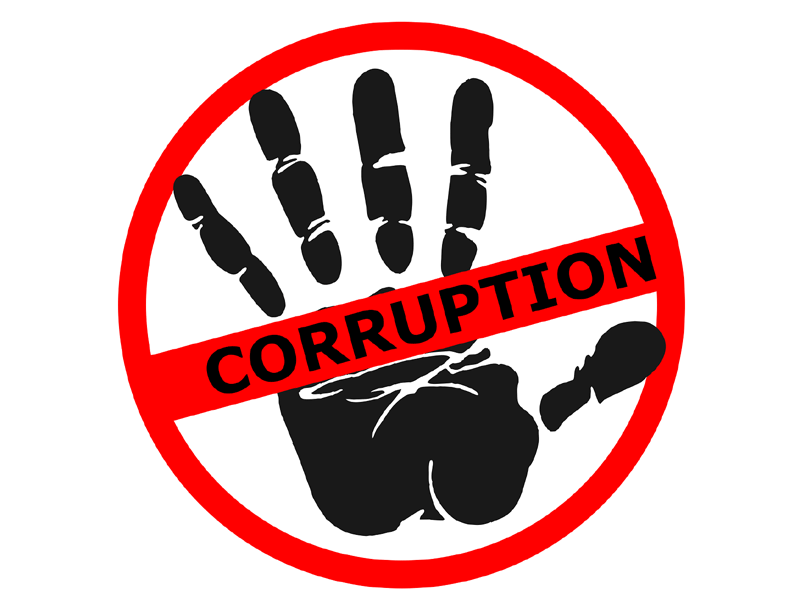‘CORRUPTION’

- 280
- 0
Corruption refers to a form of criminal activity or dishonesty. It refers to an evil act by an individual or a group. Most noteworthy, this act compromises the rights and privileges of others. Furthermore, Corruption primarily includes activities like bribery or embezzlement. However, corruption can take place in many ways. Most probably, people in positions of authority are susceptible to Corruption.
Corruption certainly reflects greedy and selfish behavior. Corruption has been prevalent in society since the shifting of powers from the people to the opportunistic authorities. The British’s advent in India started to significantly affect the middle class, who gradually started occupying essential jobs in the country with their education.
This sudden change in power made them greedy and more prone to bribery. Corruption is not merely financial embezzlement or earning money through bribery or fraud but it means moral deterioration and the use of corrupt practices. Acts which are tantamount to provide undue favor, abuse of public office and patronization also come under corruption.
This is deviation of the formal public duties for private gains. As a result of materialistic and opportunist way of life, corruption or corrupt practices become an integral part of those people who are neither apologetic nor ashamed of their corrupt behavior.
The problem is in the last four decades or so in Pakistan, the paradigm has changed in terms of rejection and acceptability of corruption. Four decades ago, corruption was considered an evil thing and a practice which was rejected by the large segment of society of Pakistan but now, corruption has not only become a way of life but has obtained some sort of legitimacy as well. Those who are not corrupt are certainly in a minority as compared to those who are engaged in corruption by design and by default.
With the erosion of ethics, values and moral traditions, corruption has permeated far and wide in Pakistani society to the extent that it is considered as an ordinary practice and necessity. It is to mention that corruption is a global phenomenon and one cannot single out a particular community or society to be corrupt but if an objective analysis is made of the existence and influence of corruption, a large number of developing countries or the post-colonial states certainly come under the category of corrupt or highly corrupt countries.
METHODS OF CORRUPTION: Corruption can be of varied types. BRIBERY: Bribery is the most common form of corruption through which people in posts of authority misuse their power to direct services according to their interests. Many material and monetary gifts are offered by people to these high officials for running certain benefits to their advantages. These are mostly government officials who are susceptible to these fraudulent acts.
FINANCIAL FRAUD: Financial fraud is also called Embezzlement. This is the act of withholding assets of the public for theft.
CORRUPTION OF POLITICIANS: This is one of the most notable types of corruption, where the people elected for public interests misuse their power for personal gains. There are little to no ways of ever identifying these corruptions in a broken system like India.
NEPOTISM: Nepotism is a form of corruption where the people of authority reserve specific posts and places of high prestige for the people of either their own family or acquaintances. It is useless to write about a number of steps Govt should take up to fight corruption, as Govt itself is filled with corruption so deep that it has reached its roots.
Corruption cannot be dealt with unless and until there is a moral awakening among people. People have to understand the serious consequences of this evil and feel how common people and poor people fall prey to it. Big industrialists should stop being greedy and stop misusing their wealth and authority and act on fair and rational basis.
Only improving country’s economic condition is not enough to combat corruption as rich people are more corrupt than the mediocre. Common people who try to fight corruption either face transfers or lose their precious lives. There is an urgent need to inculcate in every individual, the sense of responsibility to stop engaging in any unfair and corrupt practices. Government officials should give the power to the public to report immediate corruptions they face in their daily lives and act on it within days. Ending corruption would lead to equal distribution of wealth and resources among all and lead to a healthy society to live in. In Pakistan various efforts were made to eradicate the menace of corruption. National Accountability Bureau (NAB) was formed under
National Accountability Ordinance (NAO) 1999 to check the plague of corruption. The NAB is the leading anti-corruption agency of Pakistan. It is charged with the task of eradication of corruption in the country. Initially corruption was eradicated by the means of force only but later on NAB adopted a three pronged strategy for curbing corruption.
The cases prepared by NAB are tried by Accountability Courts. it is essential to remember that corruption will not go away simply with a change of government. It’s important that the government comes up with a comprehensive policy which should not only be long term but also address the structural problems which lead to corruption.
This will require making the workings of government institutions and policymaking more transparent. However, NAB Pakistan under its current Chairman is making all efforts for eradication of corruption which is commendable.
Published in The Daily National Courier, October, 20 2022
Like Business on Facebook, follow @DailyNCourier on Twitter to stay informed and join in the conversation.

















































